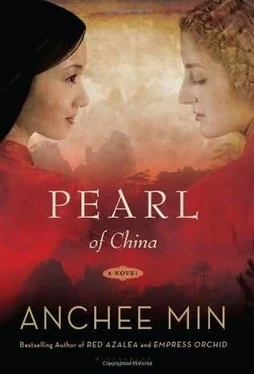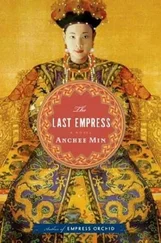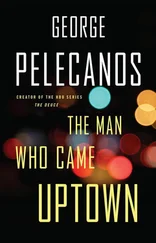It was easy for me to imagine how my friend had been swept off her feet.
“When Lossing told me that Chinese peasants would be freed from their backbreaking labor if his methods succeed, I fell in love with him. Lossing was fascinated by my life growing up in China. When he realized I spoke so many Chinese dialects, he proposed right away.”
“When did you say yes?” I asked.
“Just after I found out that Lossing’s Chinese would never get him anywhere. He is tone-deaf. How can you be tone-deaf and learn Chinese?”
“So he needs you.”
“I need him, too. I haven’t been able to fall in love with any man in America, to tell you the truth.” Pearl said that she had made efforts to date, but she had felt like a foreigner in America. “I spoke English, but I didn’t understand the culture. I felt out of place and confused. What we would consider rude in China, Americans consider attractive. My relatives thought that I was strange and I thought that they were strange. On the surface, I got along with everybody, but inside I was lonely. For the entire four years I felt that way. I was afraid that I might never like a man enough to marry him. In the meantime, my Chinese mind told me that I’d better hurry or I’d end up an old maid.”
“Lossing’s timing is perfect,” I commented.
“Yes, China brought us together. God has answered my prayers. Lossing and I couldn’t be more blessed!”
For Pearl ’s sake, I hoped that she was right.
I sensed that Pearl had given up America to come back and care for her mother. I asked if it was the truth.
She admitted that Carie was an important reason why she returned. “I love America, but not enough to stay,” she said.
“You can go back to America anytime you want, can’t you?”
“That’s true. But Lossing is like Absalom. He is determined to die in China.” She laughed. Her eyes were radiant with cloudless pleasure.
The first time I witnessed Pearl and Lossing’s differences was at their wedding. Pearl was wearing a Western wedding gown, while Lossing wore a dark suit. Pearl held a bouquet of flowers picked that morning from Carie’s garden. As Pearl was led to the church, the town’s children sang American songs Carie had taught them. Afterward they sang the Chinese wedding song, which delighted Pearl because she used to sing the song as a child.
Buddha sits on a lotus pad,
Beautiful fingers orchidlike.
Sun goes down and moon comes up,
May your life be peaceful and tranquil.
Mud walls and straw pillows,
Fruits, seeds, and many sons.
Happiness and longevity,
May you have the spring and all its fair weather.
Lossing didn’t care for the song. When our friends from the Wan-Wan Tunes troupe came to congratulate the couple and performed the popular musical The Pig’s Wedding, Lossing became upset.
While Pearl felt honored, Lossing felt humiliated. He didn’t like the pig bridegroom, although the character was a hero in the classic Chinese novel Journey to the West. I could tell that Lossing’s offense and lack of humor bothered Pearl, but she didn’t make a show of it.
Carie had planned the wedding to the last detail. Besides Papa, Carpenter Chan, Lilac, and many of her other Chinese friends, Carie invited the English consul, the embassy doctor, their wives, and her other missionary friends. Carie didn’t expect the entire town of Chin-kiang to invite itself. However, the Chinese believe that a good wedding must be packed, and the townspeople felt that Carie’s daughter deserved everyone’s blessing.
Pearl wanted me to be the hostess. She didn’t care that I had been married before. But all the women in town, myself included, thought it was a bad idea. I was considered abandoned by my husband, and therefore I was bad luck for a new bride. Instead Pearl asked me to hire the local chefs and pick the size and color of the melons and fruits that would be piled throughout the entrance and hallway. It was important in Chinese custom to invite all the gods by displaying the symbols of festivity and fertility.
Seeds, nuts, and fruits were thrown at the couple as soon as Pearl and Lossing were pronounced husband and wife. The church courtyard was overflowing with cheerful people. I helped Carie as she gave candies to people and thanked them for coming.
Led by Papa, the crowd paraded through the town. We arrived at Absalom and Carie’s house. The new couple’s room was on the second floor. The pink curtains and the beautiful Persian rug were from Carie’s own room. The banquet was to be held downstairs, where nine courses of Chinese dishes would be served.
Pink-cheeked and in a red Chinese dress, Pearl came downstairs and served tea. She lit cigarettes for the elderly and placed jasmine buds in the palms of young children. Outside, there was the sound of firecrackers. This was to invite good omens. The local band started to play.
Lossing said in English that he didn’t want to play clown and be pushed around by a Chinese crowd. He wanted no part of what he called their “silly games.” It was no use that the locals kept cheering. Pearl ended up apologizing for Lossing.
Told by their parents to help inspire fertility, children hid themselves under the wedding-night bed. They were chased away by Lossing.
Lossing was disgusted when he saw all the chopsticks reaching toward the same plate. He said he would rather starve.
When Pearl encouraged Lossing to taste her favorite Chin-kiang sesame candy, Lossing pointed out the seller’s dirt-filled fingernails and gave Pearl a lesson on how disease spreads.
Pearl was confident that Lossing would soon get used to the Chinese culture. She never doubted that she could create harmony in her marriage. She had faith in Lossing’s ability to understand. “After all, he graduated from Cornell,” she told me.
At Lossing’s request, Pearl accompanied him into the countryside. Lossing began his agricultural project by surveying the land. Pearl became his personal assistant, interpreter, guide, interviewer, field secretary, and footman. She got up at dawn and worked with Lossing in the fields until nightfall.
As I had feared, it didn’t take long for Pearl to lose her enthusiasm. She found herself fighting the widening gap between herself and her husband.
“Conflict is a sign of a healthy relationship,” she said when I asked about her marriage. It pleased her that Lossing was getting what he needed. Pearl wanted to fulfill the role of a good wife. She made it her duty to be pleasant and cheerful.
“Lossing carries far too heavy a burden,” she told me. “His well-being depends on me.” She wouldn’t admit that he didn’t even notice what she cooked for him. Unlike the Chinese, who lived to eat, Lossing ate to live.
While Carie accepted Lossing, Absalom began to have trouble. He disapproved of Lossing’s interference with the way Chinese peasants did their business. The two fought often and finally quit speaking to each other.
Pearl was right that there were similarities between Absalom and Lossing. Absalom’s mission was to save Chinese souls, and Lossing’s mission was to fix Chinese farming methods. Absalom believed that the Christian God ought to be the only God. Lossing believed that his farming method was the best.
But Pearl had her doubts. She said to Lossing, “The Chinese have survived, farming for thousands of years, on the same land and by the most skillful use of fertilizers and irrigation. They produce extraordinary yields without modern machinery!”
The couple moved away soon after Lossing’s proposal was approved by the governor of Anhui province. Lossing didn’t take the governor’s advice to move after the winter. He couldn’t stand Absalom another minute.
Reluctantly, Pearl followed Lossing. They moved to a town north of Chin-kiang called Nanhsuchou, in Anhui province. Pearl didn’t want to leave her mother behind. I asked Pearl why Lossing had to go to the poorest province in China. “Why can’t he find a better place to conduct his project?”
Читать дальше












